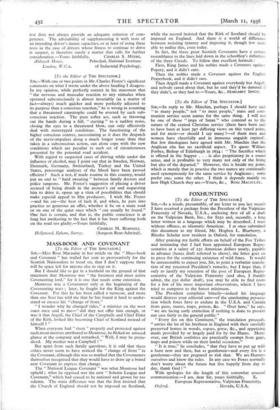[To the Editor of THE SPECTATOR.] SIR,—With one or two
points in Mr. Charles Foster's significant comments on what I wrote under the above heading I disagree. In my opinion, while perfectly correct in his statement that " the nervous and muscular reaction to any stimulus when operated subconsciously is almost invariably (as a matter of fact—always) much quicker and more perfectly adjusted to its purpose than a conscious reaction," he is wrong in assuming that a threatened catastrophe could be averted by such sub- conscious reaction. The pure reflex act, such as throwing out the hands during a fall, " starting " to a sudden noise, closing the eyes to a threatened blow, can only effectively deal with stereotyped conditions. The functioning of the higher conscious centres, necessitating as it does the despatch of the nerve-impulses along a much longer route than that taken in a subconscious action, can alone cope with the new conditions which are peculiar to each set of circumstances presented by the potential road accident.
With regard to suspected cases of driving while under the influence of alcohol, may I point out that in Sweden, Norway, Denmark, Germany, Switzerland, Turkey and the United States, percentage analyses of the blood have been proved efficient? Such a test, if made routine in this country, would put an end to " hard swearing " between family doctors and police surgeons. Mr. Foster's suggestion of placing a driver accused of being drunk in the accuser's car and requesting him to drive it, opens up a vista of possibilities that should make especial appeal to film producers. I wish Mr. Foster —and his car—the best of luck if, and when, he puts into practice so generous an offer, whether it be on a main road or on one of the quiet ones which " can usually be found." One fact is certain, and that is, the public conscience is at long last awakening to the fact that it has been suffering foolb on the road too gladly.—Yours faithfully,
CHARLES M. BEADNELL










































 Previous page
Previous page